
Bedufora
Ask a doctor about a prescription for Bedufora

How to use Bedufora
Leaflet accompanying the packaging: information for the user
Bedufora, (200 micrograms + 6 micrograms)/measured dose, inhalation aerosol, solution
Beclometasone dipropionate + Formoterol fumarate dihydrate
You should carefully read the contents of the leaflet before using the medicine, as it contains important information for the patient.
- You should keep this leaflet, so that you can read it again if you need to.
- In case of any doubts, you should consult a doctor, pharmacist, or nurse.
- This medicine has been prescribed specifically for you. Do not pass it on to others. The medicine may harm another person, even if their symptoms are the same.
- If the patient experiences any side effects, including any side effects not listed in this leaflet, they should tell their doctor, pharmacist, or nurse. See section 4.
Table of contents of the leaflet
- 1. What is Bedufora and what is it used for
- 2. Important information before using Bedufora
- 3. How to use Bedufora
- 4. Possible side effects
- 5. How to store Bedufora
- 6. Contents of the packaging and other information
1. What is Bedufora and what is it used for
Bedufora is a solution in an inhalation aerosol, containing two active substances that are inhaled through the mouth and delivered directly to the lungs.
The medicine contains two active substances: beclometasone dipropionate and formoterol fumarate dihydrate.
Beclometasone dipropionate belongs to a group of medicines called corticosteroids, which have an anti-inflammatory effect by reducing swelling and irritation of the lungs.
Formoterol fumarate dihydrate belongs to a group of medicines called long-acting bronchodilators, which relax the muscles in the airways and make breathing easier.
Together, these two active substances make breathing easier by relieving symptoms such as:
shortness of breath, wheezing, and cough in patients with asthma, and also help prevent asthma symptoms.
Bedufora is intended for the treatment of asthma in adults.
Bedufora is used in patients who:
have asthma symptoms that are not adequately controlled with inhaled corticosteroids and a short-acting bronchodilator used as needed.
- or
have achieved adequate control of asthma symptoms with both inhaled corticosteroids and long-acting bronchodilators.
2. Important information before using Bedufora
When not to use Bedufora:
- if the patient is allergic to beclometasone dipropionate or formoterol fumarate dihydrate or any of the other ingredients of this medicine (listed in section 6).
Warnings and precautions
Before starting to use Bedufora, you should discuss this with your doctor, pharmacist, or nurse:
- if the patient has heart disease, such as angina (chest pain), heart failure, narrowing of the heart arteries, heart valve problems, or any other heart disease
- if the patient has high blood pressure or an aneurysm (abnormal widening of a blood vessel wall)
- if the patient has irregular heart rhythms, such as rapid or irregular heartbeat, rapid pulse, or palpitations, or if there is any information about an abnormal heart rhythm
- if the patient has hyperthyroidism
- if the patient has low potassium levels in the blood
- if the patient has liver or kidney disease
- if the patient has diabetes (inhalation of high doses of formoterol may increase blood glucose levels, so before starting this medicine and from time to time during treatment, additional blood tests may be necessary to check blood sugar levels)
- if the patient has a pheochromocytoma (a tumor of the adrenal gland)
- if the patient is scheduled for general anesthesia. Depending on the type of anesthesia, it may be necessary to stop taking Bedufora at least 12 hours before anesthesia
- if the patient is being treated or has been treated for tuberculosis or if the patient has a viral or fungal infection in the chest
- if the patient must avoid consuming alcohol for any reason.
Before using Bedufora, you should always inform your doctor if any of the above warnings apply to you.
Before using this medicine, you should consult a doctor, pharmacist, or nurse if you have any current or past health problems or allergies, or if you are unsure whether Bedufora can be used.
Your doctor may from time to time order a blood test to check your potassium levels, especially if you have severe asthma.
Like other bronchodilators, Bedufora may cause a sudden decrease in blood potassium levels (hypokalemia). This is related to the lack of oxygen in the blood caused by taking other medicines at the same time as Bedufora, which can exacerbate the decrease in blood potassium levels.
If you have been taking high doses of inhaled corticosteroids for a long time, you may be more likely to need corticosteroids during periods of stress. Stressful situations may include hospitalization after an accident, serious injury, or upcoming surgery.
In such situations, your doctor will decide whether to increase the dose of corticosteroids or recommend other steroids in the form of tablets or injections.
If you need to be hospitalized, you should take all your medicines and inhalers, including Bedufora, and any over-the-counter medicines, if possible, in their original packaging.
If the patient experiences blurred vision or other vision disturbances, they should contact their doctor. Children and adolescents
Bedufora should not be used in children and adolescents under the age of 18.
Bedufora and other medicines
- You should tell your doctor, pharmacist, or nurse about all the medicines you are currently taking or have recently taken, including those available without a prescription. This is necessary because Bedufora may affect the action of some other medicines. Similarly, some medicines may affect the action of Bedufora.
In particular, you should tell your doctor, pharmacist, or nurse if you are taking the following medicines:
- certain medicines that may enhance the effect of Bedufora and your doctor may want to closely monitor your condition while taking such medicines (including some HIV medicines: ritonavir, cobicistat);
- beta-blockers. Beta-blockers are medicines used to treat many diseases, including heart disease, high blood pressure, and glaucoma (increased pressure in the eye). If it is necessary to administer beta-blockers (including eye drops), the effect of formoterol may be reduced or formoterol may not work at all;
- medicines that stimulate beta-adrenergic receptors (medicines that work in the same way as formoterol) - may enhance the effect of formoterol;
- medicines used to treat irregular heart rhythms (quinidine, disopyramide, procainamide);
- medicines used to treat allergies (antihistamines);
- medicines used to treat symptoms of depression or mental disorders, such as monoamine oxidase inhibitors (e.g., phenelzine and isocarboxazid), tricyclic antidepressants (e.g., amitriptyline and imipramine), phenothiazines;
- medicines used to treat Parkinson's disease (L-dopa);
- medicines used to treat hypothyroidism (L-thyroxine);
- medicines containing oxytocin (which cause uterine contractions);
- medicines used to treat mental disorders, such as monoamine oxidase inhibitors (MAOIs) or medicines with similar properties, such as furazolidone and procarbazine;
- medicines used to treat heart disease (digoxin);
- other medicines used to treat asthma (theophylline, aminophylline, or steroids);
- diuretics.
You should also inform your doctor if you are scheduled to undergo general anesthesia for surgery or a dental procedure.
Pregnancy, breastfeeding, and fertility
There are no clinical data on the use of Bedufora during pregnancy.
Bedufora should not be used if you are pregnant, think you may be pregnant, or plan to have a baby, or if you are breastfeeding, unless your doctor decides otherwise.
Driving and using machines
It is unlikely that Bedufora will affect your ability to drive or use machines.
Bedufora contains alcohol
Bedufora contains 9 mg of alcohol (ethanol) in each puff, which is equivalent to 0.25 mg/kg body weight per dose, when two puffs are used. The amount of alcohol in two puffs of this medicine is equivalent to less than 1 mL of beer or 1 mL of wine. The small amount of alcohol in this medicine will not have noticeable effects.
3. How to use Bedufora
This medicine should always be used as directed by your doctor or pharmacist. If you are unsure, you should consult your doctor or pharmacist.
Your doctor will regularly check that you are taking the optimal dose of Bedufora.
Your doctor will determine the smallest dose that will provide the best control of your asthma symptoms.
Dosage:
Adults and the elderly:
The recommended dose is two puffs twice a day.
The maximum daily dose is 4 puffs.
Remember: You should always carry a fast-acting inhalation medicine with you to relieve asthma symptoms or an acute asthma attack.
Special patient groups:
There is no need to adjust the dosage in elderly patients. There is no information on the use of Bedufora in patients with liver or kidney impairment.
Use in children and adolescents under 18 years of age:
This medicine should not be used in children and adolescents under the age of 18.
The dose of beclometasone dipropionate in Bedufora that is effective in treating asthma may be lower than the dose contained in other inhaled medicines containing beclometasone dipropionate. If you have previously used another inhaled medicine containing beclometasone dipropionate, your doctor will recommend the appropriate dose of Bedufora to use to treat your asthma.
Do not increase the dose.
If you feel that the effect of the medicine is insufficient, you should always consult your doctor before increasing the dose of the medicine.
If your asthma symptoms worsen:
If your asthma symptoms worsen or if you have difficulty controlling them (e.g., if you need to use another inhalation medicine to relieve symptoms more frequently) or if the inhalation medicine to relieve symptoms does not relieve the symptoms, you should immediately inform your doctor. This may indicate that your asthma is worsening, and your doctor may decide to change the dose of Bedufora or use another treatment.
Method of administration:
Bedufora is intended for inhalation use.
This medicine is in a pressurized container, in a plastic casing with a mouthpiece. At the back of the inhaler, there is a dose counter for 120 doses and a dose indicator for 180 doses, which informs you of the number of doses remaining.
In the case of a 120-dose packaging, each press of the container releases a dose of the medicine, and the counter counts down by one. Be careful not to drop the inhaler, as this may cause the counter to count down.
In the case of a 180-dose packaging, the dose indicator will show the approximate number of uses (puffs) remaining in the container. The dose indicator window displays the number of puffs remaining in the inhaler in units of twenty (e.g., 180, 120, 100, 80, etc.). When 20 doses remain, and the display shows 20, it means that the container is approaching the end of its usage period.
When 180 doses have been used, the display will show 0.
The indicator will stop moving at "0".
Testing the inhaler:
Before first use, or if the inhaler has not been used for 14 days or more, you should perform an inhaler test to ensure it is working properly.
- Remove the protective cap from the mouthpiece.
- Hold the container upright with the mouthpiece pointing downwards.
- Point the mouthpiece "away from you" and press the container firmly to release one puff.
- If the inhaler has not been used for 14 days or more, press the container firmly to release one puff.
- If the inhaler is being used for the first time, press the container firmly once to release a puff.
- For a 120-dose packaging, check the dose counter. If the inhaler is being tested for the first time, the counter should show 120.
- For a 180-dose packaging, check the dose indicator. If the inhaler is being tested for the first time, the counter should show 180.
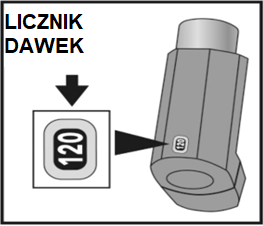
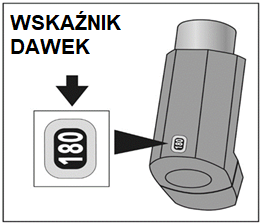
How to use the inhaler:
If possible, you should stand or sit upright while inhaling.
Before starting to inhale, check the dose counter or dose indicator, which shows how many doses are remaining. If the dose counter or dose indicator shows "0", there are no doses remaining - you should discard the inhaler and purchase a new one.
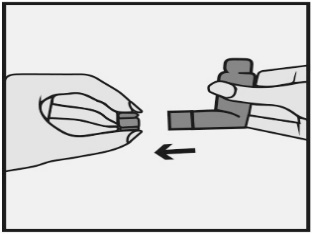
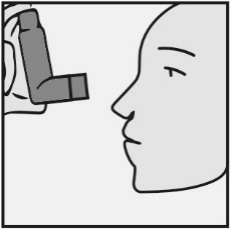

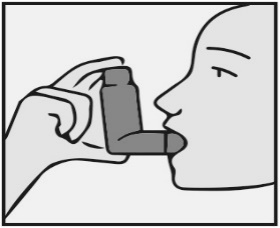
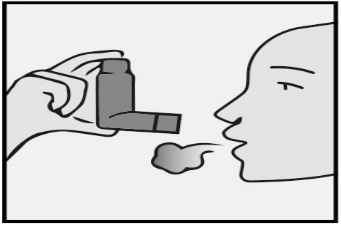
- 1. Remove the protective cap from the mouthpiece and check that the mouthpiece is clean and free of dust or other contaminants (Figure 1).
- 2. Exhale as deeply and slowly as possible (Figure 2).
- 3. Hold the container upright, with the stem pointing upwards, and then place the mouthpiece between your lips. Do not bite on it (Figure 3).
- 4. Take a deep and slow breath in through your mouth. Just after starting to breathe in, press the top of the inhaler firmlyto release one puff of medicine. People with a weak grip will find it easier to hold the inhaler with both hands: they should then place both index fingers on the top of the inhaler and both thumbs on the bottom (Figure 4).
- 5. Hold your breath for as long as possible, then remove the inhaler from your mouth and breathe out slowly. Do not breathe out into the inhaler (Figure 5).
If you need to take another dose, hold the inhaler upright for about half a minute, then repeat the steps described in points 2 to 5.
Important:The steps described in points 2 to 5 should not be performed too quickly.
After use, replace the protective cap and check the dose counter for a 120-dose packaging and the dose indicator for a 180-dose packaging.
In order to reduce the risk of fungal infections of the mouth and throat, you should rinse your mouth or throat with water or brush your teeth after each inhalation.
When to replace the inhaler
If the counter or dose indicator shows 20, you should have a new inhaler ready.
You should stop using the inhaler when the indicator shows 0, as the medicine remaining in the container may not provide a full dose.
If a "mist" appears from the top of the inhaler or from the side of the mouth, it means that Bedufora will not reach the lungs as it should. You should take another puff, following the instructions, starting again from point 2.
If you feel that the effect of Bedufora is too strong or too weak, you should consult your doctor or pharmacist.
If you have difficulty using the inhaler during inhalation, you can use a spacer (AeroChamber Plus). You should ask your doctor or pharmacist about this device.
It is important to carefully read the leaflet that comes with the AeroChamber Plus spacer and follow the instructions for use and cleaning.
Cleaning
The inhaler should be cleaned once a week.
When cleaning, do not remove the container from the plastic casing, and do not use water or other liquids to clean the inhaler.
Cleaning the inhaler:
- 1. Remove the protective cap from the mouthpiece by pulling it off the inhaler.
- 2. Wipe the mouthpiece and the dose counter or dose indicator from the inside and outside with a dry cloth or tissue.
- 3. Replace the protective cap.
Using a higher than recommended dose of Bedufora:
- using a higher than recommended dose of formoterol may cause the following symptoms: nausea, vomiting, rapid heartbeat, palpitations, irregular heart rhythms, changes in the electrocardiogram (ECG), headache, tremors, drowsiness, too many acidic products in the blood, decreased potassium levels in the blood, increased glucose levels in the blood. Your doctor may recommend a blood test to check your potassium and glucose levels.
- using too high a dose of beclometasone dipropionate may cause short-term adrenal gland problems. This condition will improve within a few days, but your doctor may recommend a blood test to check your cortisol levels.
If you experience any of these symptoms, you should inform your doctor.
Missing a dose of Bedufora
You should take the missed dose as soon as possible. If it is almost time for your next dose, do not take the missed dose, just take the next dose at the usual planned time. Do not take a double dose to make up for a missed dose.
Stopping use of Bedufora
Even if you feel better, you should not stop using Bedufora or reduce the dose without consulting your doctor. It is very important to regularly use Bedufora, even when your symptoms have disappeared.
If you have any further doubts about using this medicine, you should consult your doctor or pharmacist.
4. Possible side effects
Like all medicines, Bedufora can cause side effects, although not everybody gets them.
As with other inhaled medicines, there is a risk of worsening shortness of breath and wheezing immediately after using Bedufora, known as paradoxical bronchospasm.You should immediately STOP using Beduforaand use a fast-acting inhaled bronchodilator to relieve shortness of breath and wheezing. You should contact your doctor immediately.
You should immediately inform your doctorif you experience any allergic reactions, such as skin allergies, itching, skin rash, skin redness, swelling of the skin or mucous membranes, especially of the eyes, face, lips, and throat.
Other possible side effects are listed below, depending on their frequency.
- Frequent(may affect up to 1 in 10 people):
- fungal infections (of the mouth and throat),
- headache,
- hoarseness,
- sore throat.
Uncommon(may affect up to 1 in 100 people):
- palpitations, irregular heartbeats, and irregular heart rhythms,
- changes in the electrocardiogram (ECG),
- increased blood pressure,
- flu-like symptoms,
- sinusitis,
- nasal congestion,
- ear infection,
- throat irritation,
- cough and cough with expectoration,
- asthma attack,
- vaginal fungal infections,
- nausea,
- taste disturbances,
- lip burning,
- dryness of the mucous membranes of the mouth,
- difficulty swallowing,
- indigestion,
- stomach upset,
- diarrhea,
- muscle pain and muscle cramps,
- redness of the face and throat,
- increased blood flow to some tissues,
- increased sweating,
- tremors,
- restlessness, especially movement,
- dizziness,
- hives,
- changes in the values of some blood parameters: decreased white blood cell count, increased platelet count, decreased potassium levels in the blood, increased glucose levels in the blood, increased insulin levels, free fatty acids, and ketone bodies in the blood.
The following side effects have also been reported as "uncommon" in patients with chronic obstructive pulmonary disease:
- pneumonia: you should inform your doctor if you experience any of the following symptoms: increased production of sputum, change in the color of sputum, fever, increased cough, increased breathing problems,
- decreased cortisol levels in the blood, which is caused by the effect of corticosteroids on the adrenal glands,
- irregular heartbeat.
Rare(may affect up to 1 in 1,000 people):
- feeling of pressure in the chest,
- irregular heart rhythms (caused by premature contraction of the heart chambers),
- decreased blood pressure,
- kidney inflammation,
- swelling of the skin and mucous membranes, lasting for several days.
Very rare(may affect up to 1 in 10,000 people):
- shortness of breath,
- worsening of asthma,
- decreased platelet count,
- swelling of the hands and feet.
Using inhaled corticosteroids in high doses for a long time may cause
in very rare cases, systemic side effects.These include:
- adrenal gland problems (suppression of adrenal gland function),
- decreased bone density (thinning of the bones),
- delayed growth in children and adolescents,
- increased eye pressure (glaucoma),
- cataracts.
Frequency not known (cannot be estimated from the available data):
- sleep disturbances,
- depression or feeling depressed,
- nervousness,
- excessive excitement or irritability.
These side effects are more likely to occur in children, but the frequency of these side effects is unknown.
- blurred vision.
Reporting side effects
If you experience any side effects, including any side effects not listed in this leaflet, you should tell your doctor, pharmacist, or nurse.
Side effects can be reported directly to the Department of Drug Adverse Reaction Monitoring of the Office for Registration of Medicinal Products, Medical Devices, and Biocidal Products,
Jerozolimskie Avenue 181C, 02-222 Warsaw, phone: 22 49 21 301, fax: 22 49 21 309,
Website: https://smz.ezdrowie.gov.pl
Side effects can also be reported to the marketing authorization holder.
Reporting side effects will help to gather more information on the safety of this medicine.
5. How to store Bedufora
The medicine should be stored out of sight and reach of children.
Single packaging containing one inhaler with 120 doses or 180 doses
For the pharmacist
Store in a refrigerator (2°C – 8°C) for a maximum of 18 months.
Write the date of issue to the patient on the self-adhesive label on the packaging and stick the label on the inhaler.
Make sure that the period between the date of issue and the expiry date printed on the packaging is at least 3 months.
For the patient
Do not store the inhaler at a temperature above 25°C.
Do not use Bedufora for more than 3 months from the date you received the inhaler from the pharmacist and never use it after the expiry date stated on the carton and label after "EXP". The expiry date refers to the last day of the month stated.
Double or triple packaging containing two or three inhalers with 120 or 180 doses
Before first use: store the inhalers in a refrigerator (2°C – 8°C) for a maximum of 18 months.
After first use: do not store the inhalers at a temperature above 25°C. Store for a maximum of 3 months. Each time you start using an inhaler, write the date of first use on one of the self-adhesive labels and stick the label on the inhaler.
Do not use this medicine after the expiry date stated on the carton and label after "EXP". The expiry date refers to the last day of the month stated.
Do not freeze.
If the inhaler has been exposed to very low temperatures, before use, you should warm it up in your hands for a few minutes. Never use other methods to heat the container.
Warning: The container contains a pressurized liquid. Do not expose to temperatures above 50°C. Do not pierce the container.
Medicines should not be disposed of via wastewater or household waste. You should ask your pharmacist how to dispose of medicines that are no longer needed. This will help protect the environment.
6. Contents of the packaging and other information
What Bedufora contains:
The active substances of the medicine are: beclometasone dipropionate and formoterol fumarate dihydrate.
Each measured dose from the inhaler contains 200 micrograms of beclometasone dipropionate and 6 micrograms of formoterol fumarate dihydrate. This corresponds to a delivered dose containing 177.7 micrograms of beclometasone dipropionate and 5.1 micrograms of formoterol fumarate dihydrate.
The other ingredients are: norflurane (HFA-134a), anhydrous ethanol, concentrated hydrochloric acid.
This medicine contains fluorinated greenhouse gases.
Each inhaler containing 120 doses contains 10.35 g of HFA-134a, which corresponds to 0.015 tons of CO2 equivalent (GWP = 1,430).
Each inhaler containing 180 doses contains 14.24 g of HFA-134a, which corresponds to 0.020 tons of CO2 equivalent (GWP = 1,430).
What Bedufora looks like and contents of the packaging:
Bedufora is available as a solution for inhalation, in a pressurized container, coated with aluminum, with a metering valve, equipped with a polypropylene actuator, which contains a dose counter (120-dose packaging) or a dose indicator (180-dose packaging) with a mouthpiece and a green protective cap made of plastic.
Each packaging contains:
- 1 pressurized container containing 120 doses or
- 2 pressurized containers, each containing 120 doses or
- 3 pressurized containers, each containing 120 doses or
- 1 pressurized container containing 180 doses or
- 3 pressurized containers, each containing 180 doses.
Not all pack sizes may be marketed.
Marketing authorization holder:
STADA Arzneimittel AG
Stadastrasse 2-18
61118 Bad Vilbel
Germany
Manufacturer:
Genetic S.p.A.
Contrada Canfora
84084 Fisciano
Italy
To obtain detailed information, you should contact the local representative of the marketing authorization holder:
Stada Pharm Sp. z o.o.
Krakowiaków 44
02-255 Warsaw
Phone: +48 22 737 79 20
This medicine is authorized in the Member States of the European Economic Area under the following names:
Austria
Beclometason/Formoterol STADA 200 Mikrogramm /6 Mikrogramm pro Sprühstoß, Druckgasinhalation, Lösung
Belgium
Beclometasone/Formoterol EG 200/6 microgram/dosis aërosol, oplossing
Croatia
Laberon 200/6 mikrograma po potisku, stlačeni inhalat, otopina
Czech Republic
Oreto
Denmark
Laberon
Estonia
Bedufora
Greece
Beclometasone+Formoterol / STADA
Finland
Oparta 200 mikrog / 6 mikrog/annos inhalaatiosumute, liuos
France
BECLOMETASONE / FORMOTEROL EG 200 / 6 microgrammes/dose, solution pour inhalation en flacon pressurisé
Iceland
Laberon
Lithuania
Bedufora 200 mikrogramų/6 mikrogramai/spūsnyje suslėgtasis įkvepiamasis tirpalas
Latvia
Bedufora 200 mikrogrami/6 mikrogrami izsmidzinājumā aerosols inhalācijām, zem spiediena, šķīdums
Norway
Laberon
Germany
Beclometason/Formoterol AL 200 Mikrogramm/6 Mikrogramm pro Inhalation Druckgasinhalation, Lösung
Netherlands
Beclometason/Formoterol CF 200/6 microgram/dosis, aërosol, oplossing
Poland
Bedufora
Romania
Beclometazonă /Formoterol Stada, 200/6 micrograme pe doză, soluţie de inhalat presurizată
Sweden
Oparta 200 mikrogram/6 mikrogram per dos inhalationsspray, lösning
Slovakia
Beklometazón/Formoterol STADA 200/6 mikrogramov/dávka
Italy
BECLOMETASONE E FORMOTEROLO EG
Date of last revision of the leaflet:
- Country of registration
- Active substance
- Prescription requiredYes
- ImporterGenetic S.p.A
- This information is for reference only and does not constitute medical advice. Always consult a licensed doctor before taking any medication. Oladoctor is not responsible for medical decisions based on this content.
- Alternatives to BeduforaDosage form: Aerosol, (100 mcg + 6 mcg)/measured doseActive substance: formoterol and beclometasonePrescription requiredDosage form: Aerosol, (200 mcg + 6 mcg)/measured doseActive substance: formoterol and beclometasonePrescription requiredDosage form: Aerosol, (100 mcg + 6 mcg)/measured doseActive substance: formoterol and beclometasonePrescription not required
Alternatives to Bedufora in other countries
The best alternatives with the same active ingredient and therapeutic effect.
Alternative to Bedufora in Spain
Alternative to Bedufora in Ukraine
Online doctors for Bedufora
Discuss dosage, side effects, interactions, contraindications, and prescription renewal for Bedufora – subject to medical assessment and local rules.














